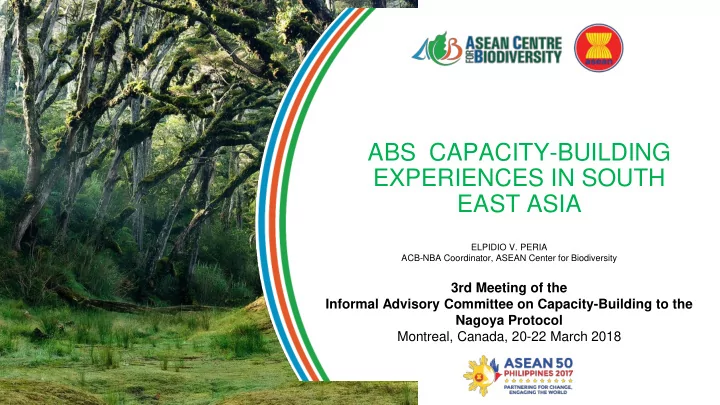

ABS CAPACITY-BUILDING EXPERIENCES IN SOUTH EAST ASIA ELPIDIO V. PERIA ACB-NBA Coordinator, ASEAN Center for Biodiversity 3rd Meeting of the Informal Advisory Committee on Capacity-Building to the Nagoya Protocol Montreal, Canada, 20-22 March 2018
OVERVIEW* • SCOPE OF CAPACITY-BUILDING EFFORTS • MAIN CHALLENGES • LESSONS FOR FUTURE CAP-BLDG INITIATIVES • HOW LESSONS ARE CAPTURED • FUTURE PROJECTS * the views expressed here are of the presentor only and DO NOT reflect the views of the ACB as an organization
TITLE • Content
TITLE • Content
I SCOPE OF CAPACITY-BUILDING EFFORTS • assessment & development of regulatory and institutional frameworks (2015-2016, UNEP-China Fund) - aimed at developing capacity to implement, and comply with the obligations, of NP (Art. 22.4[a]) - aimed at developing capacity to develop, implement and enforce domestic legislative, administrative, or policy measures on ABS (Art. 22.4[c])
I SCOPE OF CAPACITY-BUILDING EFFORTS • pilot-testing of MAT - Vietnam, Lao PDR, Myanmar - aimed at developing capacity to negotiate mutually-agreed terms (Art. 22.4[b])
MAIN CHALLENGES • the diffused nature of the subject, making the authority over it spread out among various ministries, agencies &offices WITHIN a country, makes the focusing of capacity-building efforts difficult • given that frameworks dealing with natural resources exploitation are already in place, making the agencies aware that they already have the basic ABS measures in place, will have to be repeated again and again
LESSONS (1) • determining legal certainty, clarity and transparency in existing access regulations can be done via a thorough assessment of what is currently in place • determination of the approriate benefit-sharing scheme is up to the country to decide • tracking utilization is difficult, but it must be done
LESSONS (2) • Nagoya Protocol's interface with ITPGRFA, etc keeps on coming up, raised by ASEAN member- states, eventually they will have to be dealt with • the context of ASEAN makes it difficult to deal upfront with the issue of TK but ASEAN member- states are aware of the issue's importance
HOW LESSONS ARE CAPTURED • via groups or core groups who will replicate the efforts • making content viral • expansion to other stakeholder groups • extent of the development of a country's institutional and regulatory framework
I FUTURE • design capacity-building programs that are embedded on what the AMS are currently doing • update ABS awareness and understanding for AMS to be able to deal with multiple challenges - synthetic biology, digital sequence information, etc • keep up with indigenous peoples' rights
I CAPACITY-BUILDING CONCERNS (1) • Singapore : not being a party to the Protocol, there are' policy and capacity building considerations if Singapore were to become a Party to Nagoya Protocol. • Malaysia : plans to do a few series of capacity building sessions with the stakeholders before the Biodiversity Act can be implemented.
I CAPACITY-BUILDING CONCERNS Vietnam : a program for “Capacity building on the management of access to genetic resources and fair and equitable sharing of benefits arising from their utilization for 2016- 2025” (Decision No. 1141/QD -TTg dated June 27, 2016 of Prime Minister) has been adopted. At the moment, activities on the ground have now been planned for implementation. • The main challenge is to introduce about ABS and its fair and equitable sharing from utilization of GRs. Hence, more intensive activities for capacity building for managerial sectors at all levels and awareness raising of the communities and researchers are most important for success implementation and enforcement of ABS regulations in the country.
n For further queries & updates : evperia@aseanbiodiversity.org
Recommend
More recommend